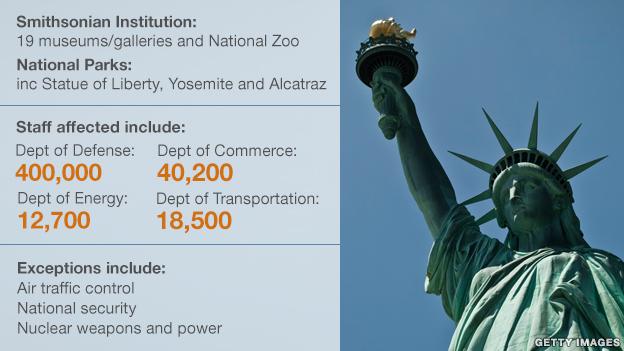Barack Obama shortens Asia trip due to US shutdown
- Published
Obama accused Republicans of demanding ransom over Obamacare
President Barack Obama has postponed two stops on his four-nation Asian tour because of the government shutdown.
The White House said it was "logistically... not possible" to go ahead with the trips to Malaysia and the Philippines at the end of his tour.
But he would still be attending regional summits in Indonesia and Brunei, the White House added.
The US government has partially shut down after the two houses of Congress failed to agree a new budget.
More than 700,000 federal employees face unpaid leave, and national parks, museums and many buildings are closed.
Mr Obama on Tuesday vowed not to allow Republicans to undermine his signature healthcare legislation as a condition to restart the US government.
"They've shut down the government over an ideological crusade to deny affordable health insurance to millions of Americans," he said at the White House.
"In other words, they demanded ransom just for doing their job."
Four-nation trip
Mr Obama had been scheduled to begin his four-nation Asian trip on Saturday, heading to Bali for an Asia-Pacific Economic Co-operation (Apec) summit and Brunei for the East Asia summit before travelling on to Malaysia and the Philippines.
National Security Council spokeswoman Caitlin Hayden called the cancellation of the trip "another consequence of the House Republicans forcing a shutdown of the government".
"This completely avoidable shutdown is setting back our ability to promote US exports and advance U.S. leadership in the largest emerging region in the world," she said.
The White House said that "logistically, it was not possible to go ahead" with the trips to Malaysia and the Philippines.
"Because they are on the back end of the president's upcoming trip, our personnel was not yet in place and we were not able to go forward with planning," the White House said in a statement.
"Unlike the Apec and East Asia Summits, these trips can also be rescheduled, and President Obama looks forward to visiting Malaysia and the Philippines later in his term."
The view on the shutdown from deserted landmarks in Washington and New York
Earlier, the office of Malaysian Prime Minister Najib Razak said Mr Obama had called him to inform him that Secretary of State John Kerry would address an entrepreneurship conference in Kuala Lumpur on 11 October in his place.
"I empathise and understand," Mr Najib told the media. "If I were in his shoes, I would do the same."
Mr Obama has been forced to call off trips to Asia before because of issues at home.
In 2010, a vote on healthcare and the Gulf of Mexico oil spill forced separate cancellations in March and June, though he did make it to India, South Korea, Japan and Indonesia in November of that year.
'A lot of anxiety'
The US government ceased operations deemed non-essential at midnight on Tuesday, when the previous budget expired.
National parks and Washington's Smithsonian museums are closed, pension and veterans' benefit cheques will be delayed, and visa and passport applications will go unprocessed.
However, members of the military will be paid.
One group of elderly military veterans managed to bypass the shutdown when the WWII Memorial in Washington DC - that they had travelled from Mississippi to see - was opened for them.
Treasury department employee Peter Gamba told the BBC he was worried by the turn of events.
"For whatever reason I cannot fathom, you're asking me to again give up my pay and give up service to the American public," he said.
"It's a nightmare for me financially, it causes me a lot of anxiety and stress and I don't sleep well at night."

President Obama has blamed conservative Republicans in the House of Representatives for the government shutdown, saying "one faction of one party" was responsible because "they didn't like one law".
Late on Tuesday the White House rejected a Republican plan to fund only a few portions of the government - national parks, veterans' programmes and the budget of the District of Columbia.
The Republicans have called for more negotiations.
A spokesman for House Speaker John Boehner called the White House's position "unsustainably hypocritical".
What does shutdown mean for two million federal employees, agencies and tourist destinations?
Rory Cooper, a spokesman for Republican House Majority Leader Eric Cantor, accused Mr Obama of "hyper-partisan speeches".
An opinion poll released on Tuesday suggested the American public disagreed with the Republican strategy.
An estimated 72% of voters oppose Congress shutting down the federal government in order to block the health law, according a poll by Quinnipiac University, external.
The healthcare law passed in 2010, was subsequently validated by the US Supreme Court, and was a major issue in the 2012 presidential election.
The next key deadline in the US is 17 October, when the government reaches the limit at which it can borrow money to pay its bills, the so-called debt ceiling.
House Republicans have demanded a series of policy concessions - including on the health law and on financial and environmental regulations - in exchange for raising the debt ceiling.
President Obama is due to meet the heads of some of Wall Street's biggest banks - including JPMorgan Chase, Goldman Sachs and Bank of America - to discuss the debt ceiling and other economic issues.
The bankers are members of the Financial Services Forum, a lobbying group which has, along with 250 other businesses, sent a letter to Congress urging it to raise the debt ceiling.